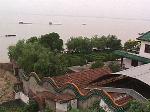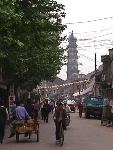- Getting around Lijiang. Dont stay in the Old Towns more than 2 days, there is nothing to do. KRISS Oct 9, 2013 05:46
- 2013 Beijing Temple Fair BENNYLAU Feb 26, 2013 03:29
- Malaysian traveling from KUL - LAX vis Shanghai PVG ZATI_DY Jan 3, 2013 20:15
Yueyang on the Shore
- Views: 3908
- |Vote: 0 0
- |Add to Favorites
- |Recommend to Friends
Lakeside in Hunan
The Chinese word for 'North' is pronounced bei, and the word for 'South' is pronounced nan. The word for 'river' he, and for 'lake' it is hu. These four words combine to form the names of four provinces in Eastern China, Hebei and Henan for the provinces immediately to the North and South of the Yellow River, and the provinces Hubei and Hunan are those bordering the second largest freshwater lake in China, Dongting Hu. It is an astonishingly beautiful lake, the scene of countless legends and fairytales told for centuries throughout China; and the most well-known city on its shores is Yueyang.
Yueyang is a tranquil township that has managed to preserve a modest yet genuine feel of a long-gone China, and which also stands in keeping with other modernised, smaller Chinese cities. It maintains a reputation as the site of the famous Yueyang Tower, which has existed in various incarnations for around 1300 years and which is associated with Chinese literature, being a reconnaissance point for great writers from ancient dynasties and itself the subject of a classic poetic essay by celebrated bard Fan Zhong Yan. For the Western traveller, however, Yueyang is a convenient place in which to experience a city that is truly Hunanese, and which is coloured by its high-cultured connotations and peaceful lakeside surrounds.
By the time my friend Lao Hei and I had arrived in Yueyang in the mid-afternoon, we had already spent the morning humbled by the vast farmlands of Hunan, the distance perceived in the faces of children at the roadside and farmers smacking the hides of thick grey cattle dredging ploughblades across the rice paddy muck. The apartment blocks set about the long distance bus station were identical in style to those I'd lived in back in Shenyang, and for a moment we were disappointed with what we'd been led to believe was a tranquil port town, as from the station it appeared to be a typical, dusty, featureless Chinese suburbia. A short walk towards where we thought the hotel would be revealed that the closer we came to the lake, the more it became apparent that Yueyang was every bit as agreeable as it is said to be. By the shore, low grey stone mazeworks of homes lay in sad and quiet counterpoint to the stringy branches of lakeside trees light in the bright reflections of the afternoon lake waters. The stretch of road on which the tower, and our hotel, lay had the look of an old, washed out beachside town, a spacious treelined avenue with old discoloured building walls. The hotel itself, the Xuelian, was a bizarre affair with complicated architecture, white segmented blocks with Chinese embellishments: a cute hostel with a lakeview, reasonably priced rooms and friendly service with staff who were delighted that Lao Hei and I could speak some Mandarin. We were in a good mood, and made for the tower very soon after organising ourselves in our very spacious and comfortable room.
Yueyang Tower, being so close to the hotel, was a good place to start looking around, but we were surprised to find that the entrance ticket cost as much as a ticket to the Forbidden City in Beijing - and seemed a bit much, considering a reasonable view of the tower could be gained from outside the wall - so we decided to save the ticket price and admire it from outside. One of the wonders of Chinese architecture, built without the use of a single nail, the tower is a flamboyant departure from Chinese austerity, but certainly in the tradition of the other buildings in the region, which are notably more decorative than those of the North. We crowded into the entrance gate to take a picture, then fled. Nearby the tower was accessway to the beach, from which the scale of the lake could be appreciated, and where wooden seats had been placed on the sand from which to sit and watch the old fishing and passenger boats congregating near the shore.
Through Yueyang
We headed for the denser housing clusters in search of another old tower that we'd read of, reportedly over a hundred years old. Walking up off the soft sand and along the old avenues past tall leafy trees, the appeal of Yueyang began to hit home. Being alongside such a broad lake, the air and sky seemed open and huge, making it impossible to feel boxed up in the city - a complaint that might be made of many other cities in China. This sensation of space lends much to the tightly packed old quarter of Yueyang, clenched around a hundred jigsawing pathways, a greystone network of wearied, ornate buildings.
It was late afternoon already and the streets were busy, mostly bustling with merchants and patrons of the small restaurants that seemed to feature on every street in great numbers. The Ci Shi tower was easy enough to find, a tall, slender pagoda crumbling behind a row of houses, where it had stood since 713AD. The oldest structure in Hunan province, we had expected some kind of signage at least, if not a ticket booth or tourist building - instead, we had to get through to the tower via a back alleyway, and were surprised to find that the tower sits in a residential courtyard, a small, shady, circular public square into which opened the doorways of several brick homes. A few house dwellers were seated outside who regarded us with calm, unsurprised faces. From the walls of their houses stretched clotheslines tied on to the base of the tower. The irreverence was charming; it only seemed to validate the authenticity of the site. We took a few pictures and then departed, wondering if we seemed like trespassers to those who lived next to the monument, to whom a corner of Hunan's history was a convenient hook for the washing.
There are probably many other sightseeing attractions in Yueyang; however it was at this point that we decided to leave off with chasing artefacts of historical importance and explore instead the living streets. We followed small roads into major intersections; carts of fruit and vegetables were encircled by crowds of dark woolly jumpers, neckscarves and hand baskets. One shopkeeper standing at a corner sang out a surprised and boisterous "Lao Wai!" and seemed delighted when we reacted with smiles. In fact, we were grinned at tirelessly by the locals, young cleanshaven men carrying bottles of the local Yueyang brand beer between painted doorways set in light brick walls, seated girls chopping eggplant on thick wooden blocks outside the garage restaurants. We could smell the salty aroma of chillied fish and spicy vegetables, and soon wanted dinner ourselves, although it wasn't until we'd located the area opposite the Yueyang brewery that we decided to sit at a table.
Upon discovering that we had some ability in Chinese, but unable to speak good standard Mandarin herself, the restaurateur fetched her father from across the footpath who beamingly recommended to us several top dishes of Xiang Cai - Hunanese style cooking. He was so tickled at having a conversation with foreigners in Chinese that he introduced us to his whole family who one by one came over to watch us eat. The mood was good, and Lao Hei and I took a few pictures with our hosts, leaving our email addresses with the kids on the thin hope that they may one day be able to contact us and receive copies - whilst not many families in small town China own a computer, netbars are prolific, but the law restricts the age of patrons as they are seen as havens for louts. We figured with the rate that China is changing, it couldn't be too long before they too would be looking at the world through a web browser.
The Xinjiangese Restaurateur
It was getting dark very fast in Yueyang, and it felt like we had walked almost every street in the city. Walking gives a very deep impression of a place, and I'll never understand how people can think they've done a city in taxis. We stopped in at a netbar ourselves for a while, which was full of louts, very stylishly dressed boys in the height of Korean fashions playing network shooter games next to their dollish girlfriends chatting to classmates in other cities on OICQ, the favourite Chinese chat client. Some enthusiastic students came to practice out their English on us, and encouraged us to go to a disco nearby, an invitation we accepted but which fell by the wayside when, upon returning to our hotel to change clothes, we fell straight to sleep.
An hour later we sat woozy and fighting with ourselves to win back some energy. Lao Hei turned on the television, and it was a good half an hour before we realised that we were sitting in the middle of Yueyang city watching Men In Black. It was a ridiculous thing to be spending travelling hours on, and we finally managed to pull ourselves out of the room.
We'd had dinner, but we were irresistibly attracted to the Xinjiangese restaurant on the corner of the main road, as the balcony seemed ideal for a combination of atmosphere and relaxation - any more marching through Yueyang streets was far from our thoughts. From the balcony we could see the lake waters, and we were reminded of our intention to sail out to Yueyang's most famous island the next day, on which grows a rare kind of tea, known as silver needle. The proprietor was a charismatic, portly gentleman who spoke with a thick accent and broad gesticulations; as with most Uighur Xinjiangese, he looked more European than Asian. Xinjiang, China's Westernmost province, is a huge area which would remind visitors more of Arabia than anywhere in the Far East, where Arabic peoples learn Mandarin Chinese in order to have access to state education. We were reminded of waiters in Mediterranean restaurants back in New Zealand with atrocious English and curly black hair; we shared a camaraderie in that Chinese was a second language for all three of us, and he spoke of the Han Chinese as if he too were a foreigner. He convinced us to buy a full meal and we were not in the least regretful for doing so. There we sat, enjoying our company, feasting on Xinjiangese lava-hot meats on the soil where poets have searched their hearts for centuries. It couldn't have been more perfect.






 Copyright © 1998-2026 All rights reserved.
Copyright © 1998-2026 All rights reserved.